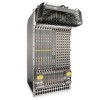Dell Force10 E1200i Installing and Maintaining the E1200i System - Page 42
Installing Line Cards and RPMs, RPMs, Line Cards
 |
View all Dell Force10 E1200i manuals
Add to My Manuals
Save this manual to your list of manuals |
Page 42 highlights
www.dell.com | support.dell.com Installing Line Cards and RPMs At a minimum, the E1200 requires one RPM and one line card to operate. CAUTION: Any slot not filled with a line card or RPM must be filled with a blank to ensure adequate cooling and EMI containment. RPMs The E1200 system requires the installation of at least one RPM, although two are recommended for redundancy. RPMs are designed to be installed in either the center R0 or R1 slots. Since FTOS searches for an RPM in slot 0 first, Force 10 recommends you install your RPM in slot 0 when only running with one RPM. Do not force RPMs into line card slots. RPMs are keyed differently than line cards to prevent improper installation. The E1200 system requires the installation of at least one RPM, although two are recommended for redundancy. RPMs are designed to be installed in either the R0 or R1 slots. Do not force RPMs into line cards slots. RPMs are keyed differently than line cards to prevent improper installation. You can hot-insert a second RPM into a running system without performance interruption or software intervention. A second RPM for redundant functionality provides uninterrupted operability if the system transitions from the active RPM to the standby RPM. The standby RPM constantly performs updates and receives the same configuration information received by the active RPM. The standby RPM also performs diagnostics on its subsystems. In the event of a failover, the standby RPM immediately takes over and resumes the control activities that the active RPM was performing. Installing a Second RPM on page 44 provides more information on the second RPM. The RPM Major and Minor alarm LEDs are controlled by software which sets the threshold levels for triggering the different stages of alarms. Line Cards Your E1200 configuration requires a minimum of one line card. Line cards are hot-swappable. The line card ports provide external interface functions for connections to other systems (for example, a router or switch). Each line card has an onboard CPU for line card management which updates packet forwarding information, obtains statistical information, and performs synchronization tasks with the RPM, as well as Dell Force10 custom-built ASICs, which enable line-rate forwarding. Line Card Port Numbering There are 14 line card slots available in the E1200 chassis. A minimum of one line card is required for operation. Line cards are installed in slots 0 through 13. Ports on line cards are numbered from the top, starting from 0 (see Figure 9-1). 42 | Installing RPMs, Line Cards, and SFMs















